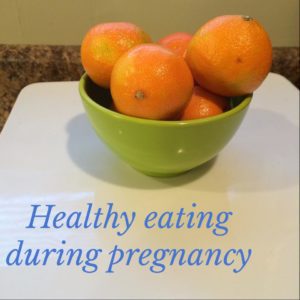Ashley Smalley, MS, RD, LD, Dietician, Mercy Hospital
When you’re pregnant, you need to eat the right foods. After all, you’re supporting a growing life.
During pregnancy you’ll need lots of extras. That includes extra protein, iron, calcium and folic acid. You’ll also need more calories.
But eating for two doesn’t mean eating twice as much. It means eating sensible, balanced meals. That way, you’ll get the right nutrients for you and your baby.
The right foods.
Most women need an extra 300 calories a day during at least the last six months of pregnancy to support a baby’s growth, says the U.S. Department of Health and Human Services (HHS). But not all calories are equal. Your baby needs healthy foods packed with nutrients. You don’t want empty calories such as those found in sweets, junk foods and soft drinks.
To get the nutrients you need, HHS says you should eat foods from each of the following food groups every day:
- Grains—fortified cereals, bread, rice and pasta.
- Vegetables—carrots, sweet potatoes, spinach, cooked greens, tomatoes and vegetable juice.
- Fruits—oranges, bananas, melon and fruit juice.
- Dairy products—nonfat or low-fat yogurt, milk and cheese.
- Proteins—cooked dried beans and peas; lean meat; poultry; eggs; peanut butter; and some types of fish.
For specific information about how much food from each group to eat each day, visit www.choosemyplate.gov/mypyramidmoms/index.html.
You should also try to eat foods that contain folic acid. This B vitamin helps prevent birth defects. Foods that are good sources of folic acid include:
- Fortified breakfast cereals.
- Leafy green vegetables.
- Beans.
- Orange juice.
You should also talk to your health care provider about vitamins and mineral supplements you may need. For example, your provider will likely recommend that you take a supplement that contains folic acid to ensure that you get enough of this important nutrient.
Other important nutrients include:
- Iron, which can help prevent anemia and help your baby develop muscles. Along with supplements, good sources of iron include lean meat and poultry, fish, dry beans and peas, eggs, spinach, and whole-wheat breads.
- Calcium, for developing strong bones and teeth. Low-fat dairy products, dark green leafy vegetables—like broccoli and kale—and tofu are good sources.
- Omega-3 fatty acids, which help support the development of your baby’s brain and eyes. Omega-3s can be found in fatty fish; fish oils; and certain fortified foods like milk, juice, bread and yogurt.
Foods to avoid.
Most foods are safe to eat when you are pregnant. But there are some foods that you are better off avoiding.
Fish are high in protein, low in fat and full of healthy nutrients. But some fish contain high levels of mercury due to pollution in oceans, lakes and rivers, which can be especially harmful to your baby. It is recommended to consume no more than 12 oz of low mercury fish weekly.
It’s best to avoid fish with high levels of mercury. This includes:
- Shark.
- Swordfish.
- King mackerel.
- Tilefish.
- Marlin.
- Orange Roughy.
- Tuna (Bigeye, Ahi).
Check with your doctor or local health department before eating any fish you catch yourself.
Other foods that can make you or your baby sick include:
- Raw or lightly cooked eggs and foods made with them.
- Unpasteurized milk or juices.
- Unpasteurized soft cheeses, such as brie and feta.
- Refrigerated smoked seafood or meat spreads.
- Raw sprouts of any kind.
- Raw or undercooked meat, poultry and seafood (e.g. sushi, ceviche).
- Store-made chicken, egg or tuna salads.
- Herbal supplements.
- Deli meats, unless re-heated until steaming hot prior to eating.
Special thanks to Ashley Smalley (MS, RD, LD), dietician from our sponsor Mercy Hospital, for sharing this information with us today. Please share this piece with any friends or family members who are expecting a baby! And be sure to contact Mercy’s Nutrition experts if you have any questions!











